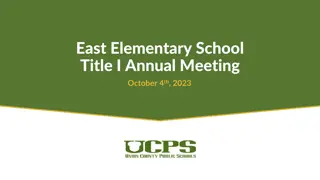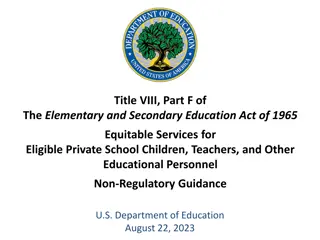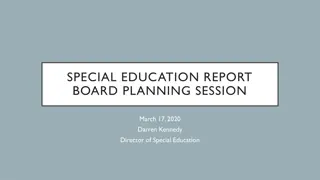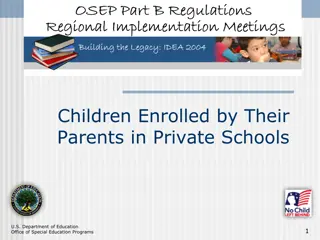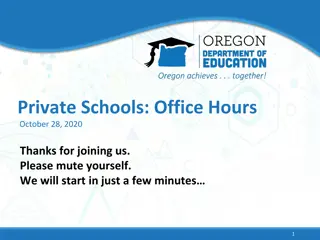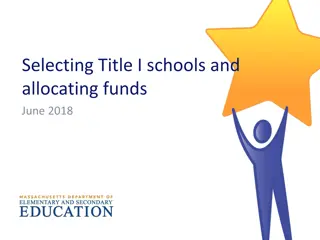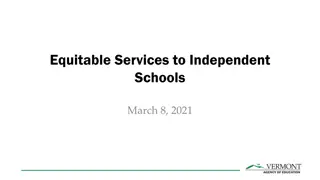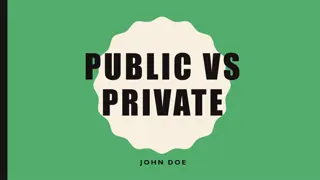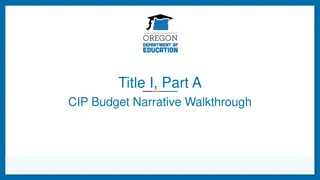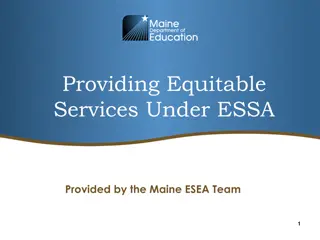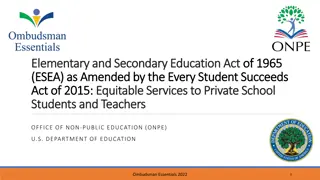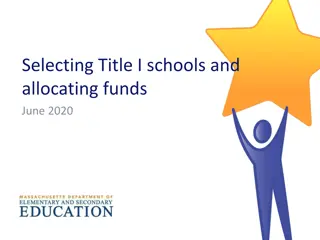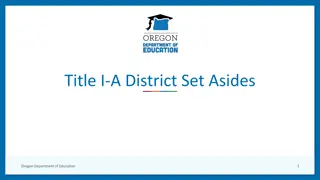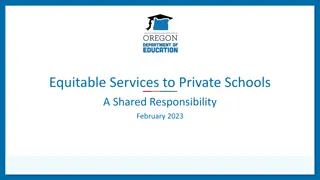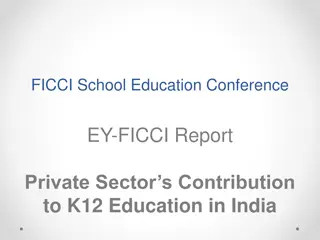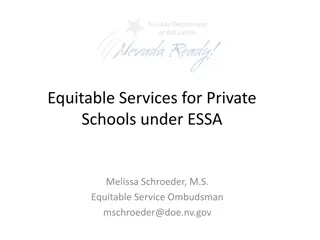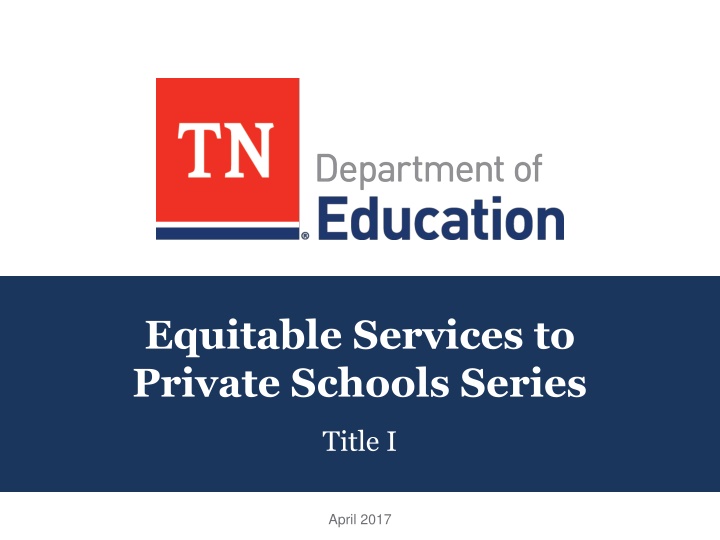
Equitable Services to Private Schools in Education Act
Learn about Equitable Services under Title I of the Elementary and Secondary Education Act, which provides services to eligible children in private schools, ensuring equitable opportunities similar to those in public schools. Consultation requirements, eligibility criteria, and the importance of collaboration with private school officials are highlighted.
Download Presentation

Please find below an Image/Link to download the presentation.
The content on the website is provided AS IS for your information and personal use only. It may not be sold, licensed, or shared on other websites without obtaining consent from the author. If you encounter any issues during the download, it is possible that the publisher has removed the file from their server.
You are allowed to download the files provided on this website for personal or commercial use, subject to the condition that they are used lawfully. All files are the property of their respective owners.
The content on the website is provided AS IS for your information and personal use only. It may not be sold, licensed, or shared on other websites without obtaining consent from the author.
E N D
Presentation Transcript
Equitable Services to Private Schools Series Title I April 2017
Keith Woodruff Equitable Services and Charter Schools Coordinator Consolidated Planning & Monitoring Keith.Woodruff@tn.gov (615) 741-3385
Agenda Equitable Services Consultation Complaints Eligible Activities Fiscal Considerations Frequently Asked Questions Resources 4
Equitable Services Under Title I 1, districts are required to provide services for eligible children2 attending private elementary and secondary schools, their teachers, and their families with Title I services or other benefits that are equitable to those provided to eligible public school children, their teachers, and their families. 1Title I, Part A 1117 of the Elementary and Secondary Education Act (ESEA), as amended by the Every Student Succeeds Act (ESSA) 2Eligible students are those students that reside in Title I school zones and are failing or at risk for failure. 6
Equitable Services The Title I services for private school students must be developed in consultation with officials of private schools. The Elementary and Secondary Education Act (ESEA), as amended by the Every Student Succeeds Act (ESSA), strengthened these requirements, by requiring meetings with private school officials and a written affirmation signed by private school officials that the required consultation has occurred and was both meaningful and timely. 7
Equitable Services To qualify for Title I assistance, a student must reside within the attendance area of a participating public school located in a low-income area and be failing, or at risk of failing, to meet student academic achievement standards. Poverty is not a requirement for eligibility. 8
Equitable Services Criteria for eligibility is determined during consultation through multiple measures such as: achievement test scores, report card grades, and teacher referral. 9
Equitable Services Services are equitable when districts: assess, address, and evaluate the needs of non-public school students, teachers, and parents; provide non-public school students and teachers with an opportunity to participate in activities equivalent to the opportunity provided to public school students and teachers; and begin services with non-public school students at the same time as public school students. 10
Equitable Funding for Students The total amount expended by the district for services to eligible private school children must be proportionate to the amount of funds generated by private school students. Private school students generally must receive an equitable amount off the top of the Title I allocation before calculating funds for public school students.
Equitable Services for Families Districts are required to calculate funds based on their total Title I allocation to carry out required parental involvement activities.1 Districts are required to reserve the calculated funds for parental involvement activities from the private school portion allocated for Title I. 2 1 Title I 1118 2 Title I 200.65
Equitable Services The district is not required to match their supports and services with Title I to supports in non-public program(s). For example, if public schools are focusing Title I services in grades K 2 (in a K 8 school), the non-public schools are not restricted to only serve grades K 2. The non-public school could serve additional grade spans if determined through consultation and collaboration. 13
Regulatory Requirements of Consultation Title I requires timely and meaningful consultation between the district and private school officials prior to any decision that affects the opportunities of eligible private school children, families, and teachers to participate in Title I programs, and shall continue throughout the implementation and assessment of activities. Title I 1117 and 200.63 15
Regulatory Requirements of Consultation Consultations must address the following for eligible private school children: How districts will identify needs; what services districts will offer; how and when districts make decisions about the delivery of services; how, where, and by whom districts will provide services; and how districts assess the academic services to private school children, and how districts use the results to improve Title I services. 16
Regulatory Requirements of Consultation Consultations must also address the following for eligible private school children: how the proportion of funds allocated for equitable services is determined. whether the district will provide services directly or through a separate district or third-party contractor. when, including the approximate time of day, services will be provided. whether to provide equitable services to eligible private school children by pooling funds or on a school-by-school basis. whether to consolidate and use funds available for Title I equitable services with funds available for equitable services under programs covered under 8501(b). 17
Goal of the Consultation Process The consultation process between public and private school officials regarding Title I program services should result in a Title I program designed to meet the educational needs of eligible private school children. 18
Consultation Process: Meeting Agendas Well-constructed meeting agendas provide road maps for well-run and focused consultation meetings. To the extent possible, envisioning the consultation needs for the school year prior to the first consultation meeting will determine what subjects should be covered in order to effectively pace the consultation process. The agenda items and timing of the meetings should follow the decisions made and the timeline established, respectively, at the first consultation meeting. 19
Statement of Affirmation Title I requires that each district must obtain a written affirmation signed by the official of each participating private school, or a representative of those schools, that the required consultation process has occurred. A signature on an affirmation form signifies that the private school official is satisfied that an equitable program has been designed to meet student needs and has a reasonable promise of being effectively implemented. 20
Right to File a Complaint Non-public schools may file a complaint with the state s ombudsman if they believe that: timely and meaningful consultation did not occur; the district did not give due consideration to the views of the non-public school officials; or the funds generated or services to be provided are not equitable. 22
Right to File a Complaint A formal written complaint must include: a statement that the SEA, district, or other entity receiving financial assistance has violated a requirement of a federal statute or regulation that applies to a program requiring equitable participation; the facts on which the statement is based and the specific statutory or regulatory requirements allegedly violated; and the signature of the complainant. 23
Right to File a Complaint A sample complaint form will be available on ePlan under TDOE Resources. Private schools must send the complaint to the district and the SEA. The district must upload to ePlan the complaint concerning equitable services and all documents they want to be considered by the ombudsman. Timeframe for SEA response is 45 days. 24
Services to Eligible Private School Students Services to eligible private school students include: instruction outside the regular classroom, extended learning time (before and after school and in the summer), family literacy programs, early childhood education programs, counseling, home tutoring, instruction using take-home computers, computer-assisted instruction, and combinations of services listed above. 26
Parent Involvement Title I places considerable emphasis on parent involvement. Research shows that parent involvement in the education of children is a critical factor in improving academic achievement. If students are to attain and maintain grade-level proficiency and achieve high academic standards, parents must support their children s learning. 27
Parent Involvement A district must provide equitable services to parents of private school participants from the funds set aside for this purpose. Activities for the parents of private school participants must be planned and implemented after meaningful consultation with private school officials and parents. 28
Parent Involvement For activities that districts can provide parents that will assist private school students in achieving high academic standards, include a written agreement between the district and parents of private school participants regarding the responsibilities of the district and parents in: the Title I program, parent meetings, student academic progress, parent teacher conferences, and parent education. 29
Professional Development Professional development is another major emphasis in Title I. Professional development activities should enrich teacher knowledge and provide opportunities for both the Title I teachers and private school teachers of Title I participants to increase their skills and knowledge regarding providing instruction to Title I children. 30
Professional Development The professional development activities for private school teachers should address how to better serve Title I students, such as providing information on research- based reading and mathematics instruction. It is inappropriate to use these funds to upgrade the instructional program in the regular classroom of the private school. 31
Allocating Funds for Equitable Services Expenditures for equitable services to eligible private school children, teachers and other educational personnel, and families must be equal to the proportion of funds allocated to participating public school attendance areas based on the number of children from low-income families who reside in those attendance areas and attend private schools. ESSA 1117(a)(4)(A) 33
Allocating Funds for Equitable Services A district must determine the proportionate share of Title I funds available for equitable services based on the total amount of Title I funds received by the district prior to any allowable expenditures or transfers of funds. ESSA 1117(a)(4)(A) 34
Obligation of Funds Funds allocated to a district for educational services and other benefits to eligible private school children, teachers and other educational personnel, and families must be obligated in the fiscal year for which the funds are received by the district. ESSA 1117(a)(4)(B) Extenuating circumstances: funds not obligated are available for equitable services in the subsequent school year. 35
Changes in Equitable Share Calculation ESSA includes significant changes in the calculation of equitable share. Title I 1117(a)(4)(A)(ii) requires that the proportionate share of funds for equitable services be determined based on: the total amount of Title I funds received by a district prior to any allowable expenditure or transfers by the district. 36
Changes in Equitable Share Calculation For all programs, 1117(a)(4)(B) requires that funds allocated to districts for educational services and other benefits to eligible non-public school children be obligated in the fiscal year for which the funds are received by the district. 37
Fiscal Considerations A district may calculate the number of children who are from low-income families and attend private schools in several ways, such as using: the same measure of poverty; comparable poverty data from a survey; comparable poverty data from a different source; proportionality; or an equated measure. 38
Frequently Asked Questions (FAQs)
FAQs for Title I Equitable Services Must the number of private school children served be equal to the number of private school students from low-income families? No. The needs of eligible private school children and the amount of funds available determine who is served and what services are received. 40
FAQs for Title I Equitable Services May a district require private school officials to verify that students attending their school reside in a Title I public school attendance area? No. It is a district s responsibility to verify the eligible private school children reside in participating public school attendance areas. The officials of the private school may help with this determination if they wish. However, the district cannot require private school officials to do this verification. 41
FAQs for Title I Equitable Services Are private school children from low-income families automatically eligible for Title I services? No. Student eligibility for Title I services for private school students is determined by: residence in a participating public school attendance area and educational need. Poverty is not a criterion. 42
FAQs for Title I Equitable Services May private school students be offered a schoolwide program? No. Since private schools are not eligible for services, schoolwide programs may not be operated in private schools. However, eligible private school children residing in an area served by a schoolwide public school program must be offered equitable services. 43
FAQs for Title I Equitable Services May the private school officials arrange for professional development services for teachers of Title I participants and submit the invoice to the district for payment? No. Private school officials are not authorized to obligate or receive Title I funds. The statute clearly states that the district must maintain control of Title I funds. No Title I funds may be paid to the private school. 44
Resources United States Department of Education Non-Regulatory Guidance and Resources ESEA Ensuring Equitable Services Title I Toolkit ESSA Non-Regulatory Guidance: Fiscal Changes & Equitable Services ESEA Non-Regulatory Guidance: Title I - Equitable Services for Eligible Private School Students ESEA Non-Regulatory Guidance: Title IX (ESSA Title VIII) - Equitable Services for Eligible Private School Students/Teachers ESSA Non-Regulatory Guidance: Title II, Part A - Building Systems of Support for Excellent ESSA Non-Regulatory Guidance: Title III English Learners ESSA Non-Regulatory Guidance: Title IV, Part A Student Support and Academic Enrichment Program 46
Questions 47
Districts and schools in Tennessee will exemplify excellence and equity such that all students are equipped with the knowledge and skills to successfully embark on their chosen path in life. Excellence | Optimism | Judgment | Courage | Teamwork
FRAUD, WASTE, or ABUSE Citizens and agencies are encouraged to report fraud, waste, or abuse in State and Local government. NOTICE: This agency is a recipient of taxpayer funding. If you observe an agency director or employee engaging in any activity which you consider to be illegal, improper or wasteful, please call the state Comptroller s toll-free Hotline: 1-800-232-5454 Notifications can also be submitted electronically at: http://www.comptroller.tn.gov/hotline 49

